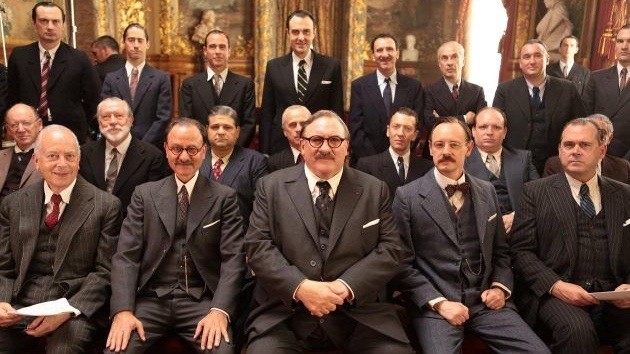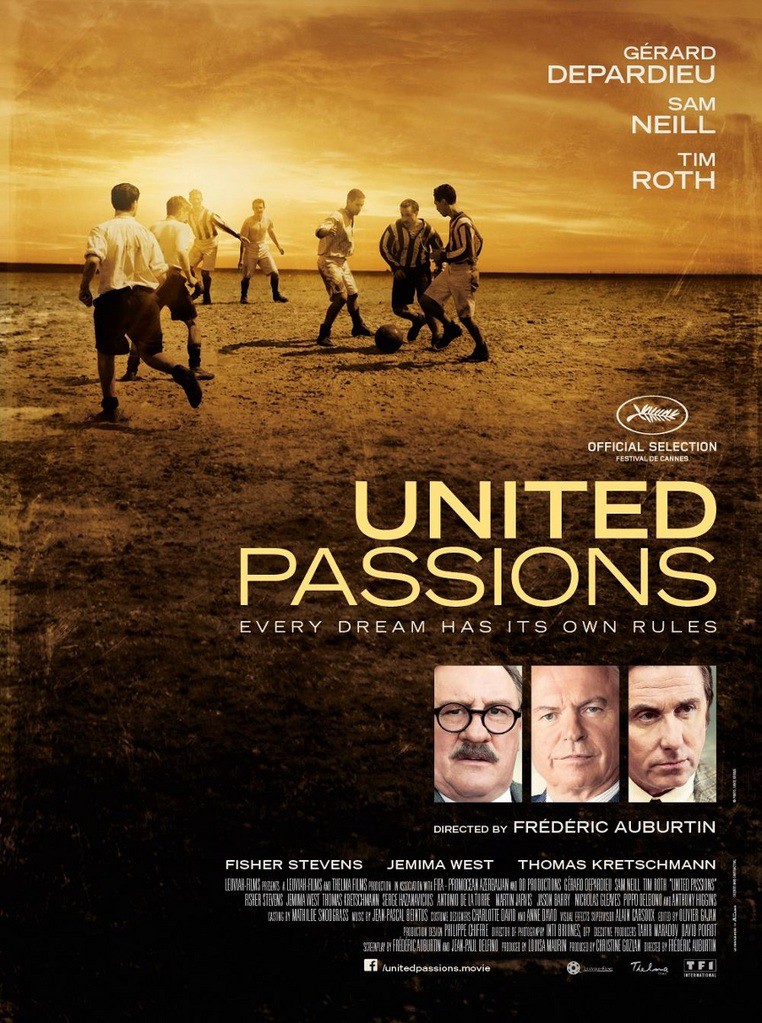FIFA’s biopic is even worse than expected, but how is that possible?

United Passions is an actuarial exercise masquerading as a film. It is the story of successive generations of FIFA officials attempting to secure and manage the organization’s finances. For these men — and they are all men — FIFA’s coffers and football’s future are one and the same. This equivalence allows United Passions to pull off a remarkable feat: It is a film about football in which there is hardly any football.
The film’s hero, then, is not Eusebio or Puskas or Pele, but Sepp Blatter, who is credited with guiding FIFA out of the economic doldrums and into the wildly lucrative existence it presently enjoys. United Passions’ Sepp Blatter is wise and honorable. He is supposed to be a minimally fictionalized version of the man under whose watch FIFA supplied $27 million of United Passions’ $32 million budget. This raises a thorny metatextual question: If Sepp Blatter is as incorruptible and financially prudent as United Passions purports, where on earth could that $27 million have gone?
One thing’s for sure: The money wasn’t spent on Frédéric Auburtin and Jean-Paul Delfino’s screenplay, which greedily collects historical drama clichés as if they were Panini stickers. The attendant montages, flashbacks, and portentous voiceovers are all there, but fail to distract from Auburtin and Delfino’s tin-eared dialogue. “He’s mad,” announces one of Rimet’s colleagues as his idea for the World Cup is introduced. “No,” proclaims another, “he’s a visionary!” Minutes later, on the boat to the inaugural World Cup in Uruguay, a photographer tells Rimet “remember, you’re making history!” Didacticism deserves better than this.

United Passions, like most historical dramas, is a story told by victors and steeped in present-day dynamics. It was first mooted in 2004 and released in 2014. The film’s evildoers conveniently hail from England, just like many of Sepp Blatter’s enemies during that decade. They are monocled and mustachioed; this is not the sort of movie where moustache twirling is allowed to be merely figurative. The Englishmen spout bigoted bile such as: “Negroes [playing football], and why not women?” United Passions presents football’s long history of racism and exclusion as the sort of pantomime villainy usually found in Disney films. Havelange and Blatter’s enfranchisement of the global south, which deserves to be lauded, gets buried under an avalanche of cheap point scoring. Any film that makes you feel like notorious racist Sir Stanley Rous deserves better, especially a film that aims to indict the man and his countrymen, can only be considered a miserable failure.
If the entirety of FIFA’s $27 million wasn’t wasted on Auburtin and Delfino’s damp squib of a screenplay, where else might the money have gone? Tens of dollars must have been splooged on Auburtin’s directorial effort. To his credit, as they stand around in rooms, the men in the movie are usually within the frame. Auburtin mixes in the occasional archival football clip, but he’s chintzy with the good stuff. Yet more cash was surely used to persuade Gerard Depardieu to return from his tax exile in Russia to sleepwalk through his part as Jules Rimet. Sam Neill and Tim Roth must also have been paid to play Joao Havelange and Sepp Blatter. Why else would they be doing this? The irony of a film about diversity triumphing over the United Kingdom’s objections hiring actors from that same United Kingdom to play the Brazilian Havelange and Swiss Blatter is lost on United Passions. Mercifully, Neill and Roth can hardly be bothered to get in character.
https://www.youtube.com/embed/60ybn1NpSJ0
That, in theory, is your movie, all $32 million of it. Azerbaijan’s film council topped off FIFA’s $27 million. The math, like everything else in United Passions, does not add up. Add this to the list of questions Loretta Lynch and the DOJ need to investigate.

There are many things wrong with United Passions, the least of which is that it’s bad. In Cameron Crowe’s similarly shambolic Elizabethtown, Orlando Bloom’s character observes: “A failure is simply the non-presence of success. Any fool can accomplish failure. But a fiasco, a fiasco is a disaster of mythic proportions.” United Passions could easily have been a fiasco, a legendary combination of bad acting, stolid direction, horrific timing, reductive politics, and accidental camp. Alas, it is merely a failure.
United Passions is too lazy to be anything more than a failure. It has the political gall of a propaganda film, but lacks the requisite follow through. Though its politics are utterly risible, Nazi propagandist Leni Riefenstahl’s Triumph of the Will remains a formal marvel, employing the filmmaker’s full arsenal of tools and tricks in an attempt to win over audiences. Triumph of the Will’s worldview is exclusionary, but Riefenstahl’s filmmaking attempts to draw you in. The inverse holds true for United Passions: Auburtin’s FIFA is an inclusive organization but, as a director, he cannot be bothered to conjure up the requisite images to convince his audience of this or anything else. His is a film so artless that you wish he would have tried to pull the wool over your eyes.
United Passions is emphatically, defiantly disinterested in you, the soccer fan.
But United Passions is emphatically, defiantly disinterested in you, the soccer fan. After premiering at the invitation-only Cannes Film Festival, it was subsequently screened down the road from FIFA headquarters at the Zurich Film Festival, graced the screens of select cinemas in Russia, Serbia, and Portugal, and went straight-to-DVD in France. For a film that has made back an infinitesimal portion of its budget, the cosmic joke of its upcoming American release could only be enhanced if the nation of Loretta Lynch now helped to recoup its losses.
Auburtin’s disinterest in persuasion reveals United Passions to be a mere vanity project — football’s answer to Rebecca Black’s “Friday.” The film exists to confirm the high regard in which its target audience and patrons already hold themselves. They don’t need to be convinced of anything. Maybe they just want to see themselves portrayed by famous people. Job done, Mr. Auburtin.
United Passions is an opportunity to look in the mirror as Sepp Blatter and take in the delusions that ensconce football’s cancerous id. Like the gilded Palace of Versailles, United Passions isn’t meant for the masses. It is bookended by scenes of children playing football in the street. “In over 100 years of existence, this federation born of a dream has survived two world wars, an unprecedented economic crisis, and made football the most played sport on the planet,” intones the narrator. United Passions has the chutzpah to suggest that these kids are only playing because the bureaucrats in Zurich do whatever it is they do. Take a lesson from the more than three million tourists who now flock to the film’s spiritual cousin in Versailles each year: Only pay the price of admission once the ancient regime has fallen.

David Rudin is a Howler web editor and a staff writer at Kill Screen. Amongst other things, he tweets fever dreams about Paolo Sorrentino one day making a Sepp Blatter biopic at @DavidSRudin.
